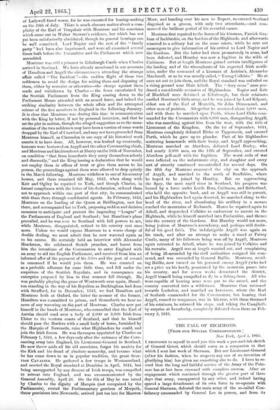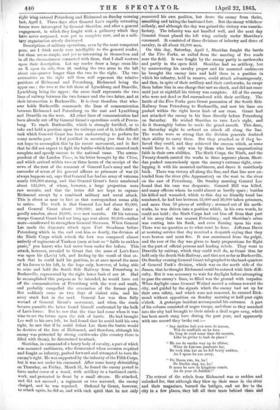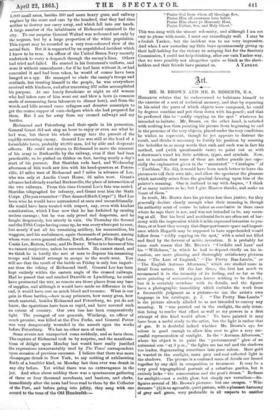THE FALL OF RICHMOND.
rFROM OUR SPECIAL CORRESPONDENT.] New York, April 5, 1865. I PROPOSED to myself to send you this week a pen-and-ink sketch of General Grant, which should serve as a companion to that which I sent last week of Sherman. But our Lieutenant-General (after his fashion, when he suspects any one of an intention of glorifying him) has given me something else to do. I have to re- cord that the long and faithful service of the Army of the Poto- mac has at last been crowned with complete success. After an engagement which continued through the greater part of three days that army, unsupported by any other, and indeed having spared a large detachment of its own force to co-operate with General Sherman, defeated the main army of the so-called Con- federacy commanded by General Lee in person, and from its right Wing entered Petersburg and Richmond on Sunday morning last, April 2. Three days after General Lee's rapidly retreating forces were intercepted by Oeneral Sheridan, and after a general engagement, in which they fought with a gallantry which they have never surpassed, were put to complete rout, and as a mili- tary organization utterly destroyed. Descriptions of military operations, even by the most Competent tens, are I think rarely very intelligible to the general reader, but these are so simple, and yet so interesting in themselves and in all the circumstances connected with them, that I shall venture upon their description. Let my reader draw a large cross like an X upon its side, thus 4 making the two arms to the left about one-quarter longer than the two to the right. The two extremities on the right will then well represent the relative - positions of Richmond and Petersburg, Richmond being the upper one ; the two at the left those of Lynchburg and Danville, Lynchburg being the upper ; the cross itself represents the two lines of railway between the two former and the two latter, and at their intersection is Burkesville. It is clear therefore that who- ever holds Burkesville commands the lines of communication between Richmond and Petersburg on the east and Lynchburg and Danville on the west. All other lines of communication had been already cut off by General Grant's operations south of Peters- burg. To reach Burkesville, which is strongly fortified, or to take and hold a position upon the railways east of it, is the difficult task which General Grant has been endeavouring to perform for many months past. I feel justified in assuring you that he did not hope to accomplish this by his recent movement, and in fact that he did not expect to fight the battles which have ensured such complete and speedy success to the national cause. The corres- pondent of the London Times, in his letter brought by the China, and which arrived within two or three hours of the receipt of the news of the rout of the remnant of General Lee's army and the surrender of seven of his general officers as prisoners of war (it always happens so), says that General Lee had an army of veterans nearly 100,000 strong, and that General Grant's force numbered about 125,000, of whom, however, a large proportion were raw recruits, and that the latter did not hope to capture Richmond except by a combined military and naval attack. This is about as near to fact as that correspondent seems able to arrive. The truth is that General Lee had about 85,000, and General Grant about 100,000; and of the latter a goodly number, about 20,000, were new recruits. Of his veteran troops General Grant had not long ago sent about 30,000—rather more—southward to strengthen General Sherman. When General Lee made the desperate attack upon Forf Steadman before Petersburg which in the end cost him so dearly, the division of the Ninth Corps which retook the fort was composed almost entirely of regiments of Yankees (men at best so "liable to sudden panic," you know) who had never been under fire before. This attack, however, revealed to Grant that the mass of Lee's force was upon his (Lee's) left, and finding by the result of that at- tack that he could hold his position, he at once moved the mass of his forces to his left, in the hope only, however, of being able to seize and hold the South Side Railway from Petersburg to Burkesville, represented by the right lower limb of our k. Had he accomplished this purpose as he intended, he would have cut off the communication of Petersburg with the west and south, and probably compelled the evacuation of the former place. But suddenly came on two days of violent rain, and his army stuck fast in the mud. General Lee was thus fully warned of General Grant's movement, and when the /loads became passable the latter found himself confronted by the bulk of Lee's forces. But he saw that the time had come when it was wise to set the future upon the risk of battle. He had brought Lee well to his own left, he had found that he could hold his own right, he saw that if he could defeat Lee there the battle would be decisive of the fate of Richmond, and therefore, although his enemy was protected by strong earthworks (the country there is filled with them), he determined to attack.
Sheridan, in command of a heavy body of cavalry, a part of which was mounted carbineers, who dismounted when occasion required and fought as infantry, pushed forward and attempted to turn the enemy's tight. He was supported by the infantry of the Fifth Corps, but A was not under his command. After some heavy skirmishing on Thursday, on Friday, March 31, he found the enemy posted in force under cover of a wood, with artillery in a bastioned earth- work, and protected in front by a small stream. He attacked, and did not succeed ; a regiment or two wavered, the enemy charged, and he was repulsed. Ordered by Grant, however, to attack again, he did so, and with such spirit that he not only recovered his own position, but drove the enemy from theirs, assaulting and taking the bastioned fort. . But the enemy withdrew sullenly, and although the day was gained the victory was unsatis- factory. The infantry was not handled well, and the next day General Grant placed the left wing entirely under Sheridan's command. It consisted of three divisions of infantry and three of cavalry, in all about 16,000 men.
On this day, Saturday, April 1, Sheridan fought the battle of the Five Forks, so called from the meeting of five roads near the field. It was 'fought by the enemy partly in earthworks and partly in the open field. Sheridan had no artillery, but by manoeuvring his cavalry proper and his mounted carbineers he brought the enemy into and held them in a position in which his infantry, held in reserve, could attack advantageously, and then, in spite of their artillery and their earthworks, he swept them before him in one charge that met no check, and did not cease until just at nightfall his victory was complete. All of the enemy who were not dead or fled surrendered with their artillery. The battle of the Five Forks gave Grant possession of the South Side Railway from Petersburg to Burkesville, and now his lines are pushed within the right lower limb of our cross. Grant had not attacked the enemy in his lines directly before Petersburg on Saturday. He wished Sheridan to turn Lee's right, and do it thoroughly before he made the grand assault. This done, on Saturday night he ordered an attack all along the line. The works were so strong that the division generals doubted their ability to carry them. But they attacked as if the be- lieved they could, and they achieved the success which, as some would have it, is only won by those who have unquestioning faith in their own abilities. The Sixth Corps, the Ninth, and the Twenty-fourth carried the works in three separate places, Sheri- dan pushed remorselessly upon the enemy's extreme right, over- lapping it with his mounted carbineers, and drove it resistlessly back. There was victory all along the line, and that line now ex- tended from the river (the Appomatox) on the west to the river on the east of Petersburg. On Sunday morning General Lee found that his case was desperate. General Hill was killed, and many officers whom he could almost as hardly spare ; besides his killed and wounded, which to this day no friendly hand has numbered, he had lost between 15,000 and 20,000 taken prisoners, and more than 50 pieces of artillery ; stormed out of his earth- works, he was driven into a position which, in his own words, he could not hold ; the Sixth Corps had cut him off from that part of his army that was nearest Petersburg ; and Sheridan's sabre was cutting into his flank, and even flaming upon his rear. There was no question as to what must be done. Jefferson Davis at morning service that day received a despatch saying that they were beaten and must flee. It was announced from the pulpit, and the rest of the day was given to hasty preparations for flight on the part of official persons and leading rebels. They went to Danville by railway, which they could well do, as Grant thus far held only the South Side Railway, and that not as far as Burkesville. On Sunday evening General Grant telegraphed to the head-quarters of General Park's division, which was on the north side of the James, that he thought Richmond could be entered with little diffi- culty. But it was necessary to wait for daylight before attempting to pass the enemy's lines, so filled was the ground with torpedo& When daylight came General Weitzel moved a column toward the city, and guided by the signals which the enemy had set up for their own safety, and which were not removed, he entered Rich mend without opposition on Sunday morning at half-past eight o'clock. A grotesque incident accompanied his entrance. A part of his column consisted of negro troops, and these as they marched into the city had brought to their minds a droll negro song, which has been much sung here during the past year, and apparently with one accord they broke out
Say darkies hab you seen de massa, Wid de mufftash on he face, Go long de road some time die nionlin, Like he gwine to leab de place ?
"He see de smoke way up de ribber, Whoa de Line= gunboats lay,
He took him hat an he leff berry sudden, An I epos° he ran away.
"De Massa run, ha, ha! De Darkie stay, ho, ho ! It muss be now de kingdom comb,
An de year oh Jubiloh!"
The retreat of the rebels from Richmond was so sudden and unlocked. for, that although they blew up their rams in the river and their magazines, burned the bridges, and set fire to the city in a few places, they left all their tents behind them ahd 5,000 small arms, besides 500 and more heavy gum, and railway
engines by the score and cars by the hundred, that they had time neither to destroy nor carry away, and which fell into our hands.
A large number of the inhabitants of Richmond remained in the city. To our surprise General Weitzel was welcomed not only by the negroes, but by a large proportion of the white population.
This report may be recorded as a very rose-coloured view of the actual fact. But it is supported by an unpublished incident which I know to be true. An officer of the United States Navy recently undertook to carry a despatch through the enemy's lines. Others had tried and failed. He started in his lieutenant's uniform, and wore it without concealment ; for if he had been without it, or had concealed it and had been taken, he would of course have been hanged as a spy. He managed to elude the enemy's troops and sentinels, but trusting himself to the people, he was everywhere received with kindness, and after traversing 237 miles accomplished his purpose. At one lonely farmhouse at night an old woman who had taken care of him went out and blew a horn (a common mode of summoning farm labourers to dinner here), and from the woods and hills around came refugees and deserter conscripts to get the coarse supper of corn-dodgers which she had prepared for them. But I am far away from my crossed railways and my battles.
Richmond and Petersburg and their spoils in his possession, General Grant did not stop an hour to enjoy or even see what he had won, but threw his whole energy into the pursuit of the rapidly-retreating enemy. General Lee was still at the head of a formidable force, probably 40,000 men, led by able and desperate officers. He could not return to Richmond to move the remnant of his army to Burkesville by the railway, even if that had been practicable, so he pushed on thither on foot, having nearly a day's start of his pursuer. But Sheridan rode hard, and Wednesday afternoon of this week saw him with his head-quarters at Peters- vile, 43 miles west of Richmond and 7 miles in advance of Lee, who was only at Amelia Court House, 36 miles west. Grant's advance had already reached Burkesville, the place of intersection of the two railways. From this time General Lee's fate was sealed. Sheridan telegraphed for infantry, and Grant sent him the Sixth Corps. (Do you remember "That damned Sixth Corps?") Had Lee been wise he would have surrendered at once and unconditionally. He would have been treated with respect, nay, even with kindest consideration, which I fear now that he has forfeited by causing useless carnage ; but he was only proud and desperate, and he fought desperately, but utterly in vain. On Thursday the Second and the Fifth Corps having come up, he was everywhere put to rout, lost nearly if not all his remaining artillery, his ammunition, his waggons, and his ambulances, again thousands of prisoners, among whom were seven general officers, Ewell, Kershaw, Fitz-Hugh Lee, Custis Lee, Button, Corse, and De Barry. What is to become of him we cannot conjecture, unless he surrenders. He cannot stand, and we think he is hardly the sort of man to disperse his remaining troops and himself attempt to escape to the south-west. You will see that the result of the battle on Friday is only less import- ant than the taking of Richmond itself. General Lee has been kept entirely within the eastern angle of the crossed railways. Had he passed that and reached Danville or Lynchburg, he could have protracted the war, so remote are those places from any base of supplies, and although it would have made no difference in the end, it would have cost us much blood and treasure. What is our gain in these battles,—how many prisoners, how many guns, how much material, besides Richmond and Petersburg, we yet do not know, the operations have been so rapid, and have covered such an extent of country. Our own loss has been comparatively light. The youngest of our generals, Winthrop, an officer of much promise, was killed at the Five Forks, and General Potter was very dangerously wounded in the assault; upon the works before Petersburg. We lost no other men of mark.
Some events not unexpected come suddenly, and so have these. The capture of Richmond took us by surprise, and the manifesta- tions of delight upon Monday last would have really justified the expressions unwarrantably used by The Times' correspondent upon occasion of previous successes. I believe that there was more champagne drunk in New York, to say nothing of exhilarating fluids of a humbler kind, on Monday last than ever was drunk in any city before. Yet withal there was no extravagance in the joy. And when about midday there was a spontaneous gathering of three or four thousand merchants, and bankers, and clerks, immediately after the news had been read to them by the Collector of the Port, and before going into jollity, they sang with one accord to the tune of the Old Hundredth:—
"Praise God from whom all blessings flow, Praise Him all creatures horn below, Praise Him above ye Heavenly Host, Praise Father, Son, and Holy Ghost."
This was sung with the utmost solemnity, and although I am not easy to please with music, I must say exceedingly well. I may be a foolish Yankee, but the incident was to me very impressive. And when I saw yesterday my little boys spontaneously giving up their half-holiday for the victory to scraping lint for the Sanitary Commission, I could not help thinking, after our vain Yankee way, that we were possibly not altogether quite so black as the slave-
holders and their friends have painted us. A YANKEE.
































 Previous page
Previous page